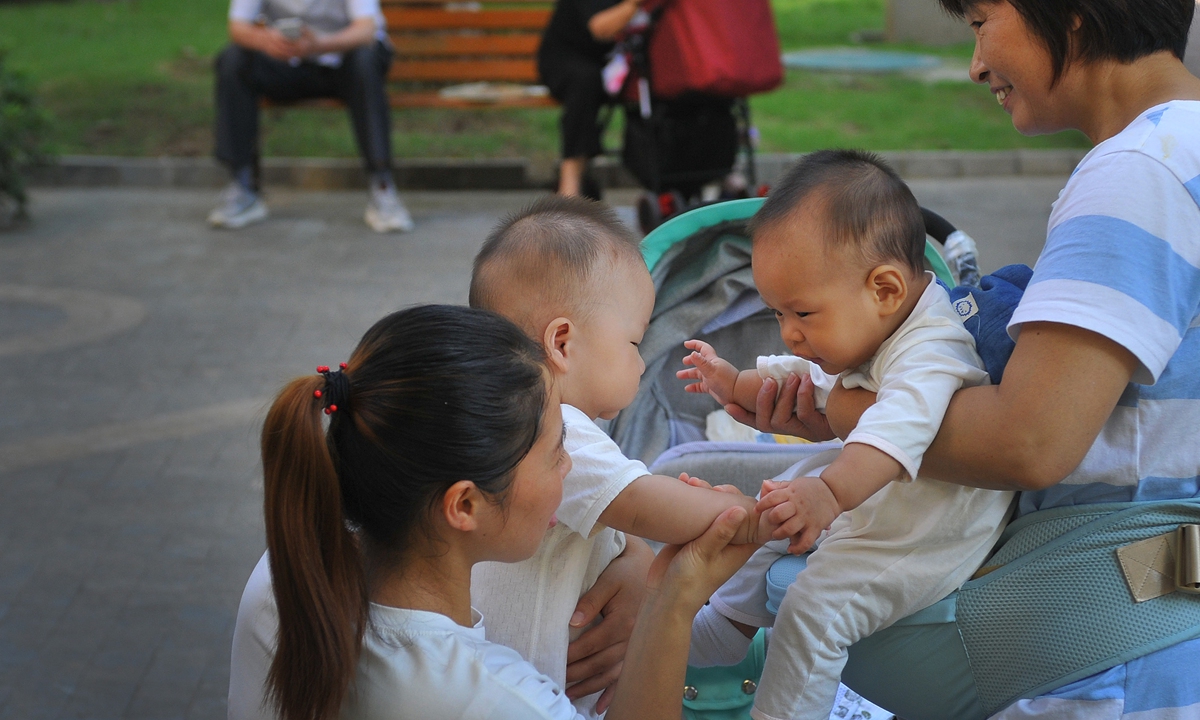
Parents holding their children play in the square of a residential community in Nanjing, capital of East China's Jiangsu Province. Photo: VCG
Contrary to the public's predictions, home quarantine during the COVID-19 epidemic did not result in a baby boom in 2020, according to latest data released by some cities in China, which showed a significant drop in the number of newborns.
Data released by the local health authority of Wenzhou, East China's Zhejiang Province, shows that the number of newborn babies in 2020 hit a new low in the past six years.
In 2020, the number of live births in 58 midwifery institutions in Wenzhou was 73,330, 19.01 percent lower than the same period in 2019, the data showed.
Local media reported that the highest number of births in Wenzhou was 144,988 in 2012, and the figure for 2020 was down nearly 50 percent from that year.
The number of live births in 2020 in Guangzhou, South China's Guangdong Province, fell to 195,500, down by nearly 100,000 compared with that in 2017, reaching the lowest level in the past 10 years, local media said. The number of live births in Guangzhou peaked due to the birth policy adjustment but then dropped rapidly, reports said.
The health authority of Ningbo, Zhejiang Province revealed data last September showing that in the first half of 2020, the number of births in the city decreased by 19.24 percent year on year, and the second-child rate decreased by 2.5 percent. The authority estimated that the number of births in 2020 will be about 36,000, a significant drop compared with 2019.
Demographers said an important reason for the decrease in births is the decrease of women of childbearing age.
They added that the number of marriages has also fallen rapidly in recent years. Compared with 2019, there were significantly fewer women of childbearing age in 2020.
There has also been a decline in fertility in recent years due to the heavy economic burden brought about by the urbanization process, the pressure of raising a child and economic factors.
While people have spent more time at home during the epidemic and couples have more opportunities to have sex, the uncertainties brought by the epidemic have exerted negative effects on fertility, demographers said.
Ma Li, former head of the Beijing-based China Population and Development Research Center, told the Global Times on Monday that bearing and raising children is a long-term and important plan for a family. In addition, home quarantine during the epidemic may have provided spare time for couples, but at the same time also brought economic pressure and uncertainties, so most couples would not choose to have babies during the outbreak.
During the epidemic in 2020, some people's incomes decreased or their jobs were not secure while their living expenses may have increased, so they feel more economic pressure, Ma said.
The special period has also brought with it restrictions. For example, during the epidemic, some people may have felt that it was very troublesome to go to the hospital for examinations. Also, people may have been concerned more about their health condition during the COVID-10 public health emergency, the demographers said.
All of these factors have triggered concerns about fertility and affected behavior, they noted.
However, as the epidemic in China began ebbing in around April 2020, people's desire to have babies seems to have been revived.
Medical staff in the reproductive department of a top hospital in Guangzhou was cited by yicai.com on Sunday as saying that before April 2020, few people went to the hospital for consultations on infertility, but after May, people had to make appointments a few days in advance to see a specialist.
Yicai.com also cited Ye Qing, a professor at Zhongnan University of Economics and Law, as saying that the number of newborns in the first half of 2021 is likely to rebound.
At the beginning of the epidemic, people were not confident, but since the outbreak has been quickly brought under control, their confidence has been restored, which will also have a positive impact on fertility, said the expert.




